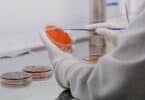Antibiotics are antimicrobial substances that are active against bacteria. Antibiotics are the most important type of antibacterial agent for fighting bacterial infections, and they are widely used in the treatment and prevention of such infections. They have the ability to either kill or inhibit the growth of bacteria.
What are antibiotics?
Antibiotic literally means against life. Antibiotics are a group of medicines that help us fight against bacteria. Antibiotics are not effective against viruses and other organisms. Before the introduction of antibiotics, one-third of all deaths occurred due to potentially curable bacterial infections.
How are antibiotics made?
Some antibiotics are produced by one organism and then used to destroy another organisms, like penicillin is made from fungus and can kill cell wall containing bacteria. All antibiotics are produced through a natural but controlled process in the lab.
How do antibiotics work?
Antibiotics are categorized according to the approach by which they damage the bacteria. For example;
- penicillins and cephalosporins kill the bacteria by destroying their cell walls,
- fluouroquinolones and metronidazole disturb the production of bacterial DNA,
- and macrolides and tetracyclines interrupt the bacteria’s protein making processes.
All the approaches either kill the bacteria instantly or slow down its growth capabilities so that it eventually dies.
What forms are available?
Antibiotics come in different forms like ointment-type (topical formulas), powders (tablets, capsules, suspensions) and liquids (syrups and injectables).
How long do antibiotics take to work?
There is no definitive time frame that we can say the antibiotic works in. Ideally, the antibiotic starts working right after you take it. But it does not mean you start feeling well right away.
The form of antibiotic used and the route of administration impact the time period between intake and effect. This mostly depends on one important thing; how long the antibiotic takes to reach the blood circulation. The injectables are the fastest to start working since they are directly introduced into the blood; capsules and tablets are the slowest because they need to be digested and broken down before they can be absorbed from the gut; while syrup, powder and chewable forms lie somewhere in between the two extremes.
Some of the antibiotics are in inactive forms and need to be worked on by the liver to become active. However, there are some antibiotics that might take days or weeks to work. These antibiotics require concentrations building up to a specific level before they can work.
When to take antibiotic?
Antibiotics are prescribed only in cases of bacterial infections. They are useless against viral infections, as mentioned before, such as in flu, common cold, etc. In most cases, antibiotics are only available on the prescription of a registered doctor.
Why should we follow prescription?
Antibiotics should be taken as advised by the doctor. Using the wrong dose, skipping doses, or taking at longer or shorter intervals than directed can lead to decreased affectivity of the medicine. Even if you feel better after a few doses of taking the antibiotic, complete the course as advised by the doctor. Under-dosing, incomplete courses and taking antibiotic when its not needed leads to development of resistant bacteria and severe infections.
Precautions:
Most antibiotics have side effects; the most common being gastrointestinal (GI) upset, like diarrhea, nausea, vomiting and cramps. And it usually goes away after stopping the medication. Some people also have allergic reactions to some antibiotics and are prescribed alternatives when needed.
Conclusion:
Today, antibiotics help many people suffering from severe infections and prevent the worsening of less serious infections. And they are most effective when used appropriately.
See Also
Difference between Oxycodone and Hydrocodone
How long does it take to get iron levels up?









